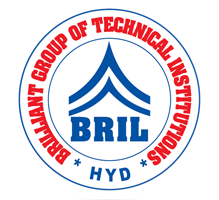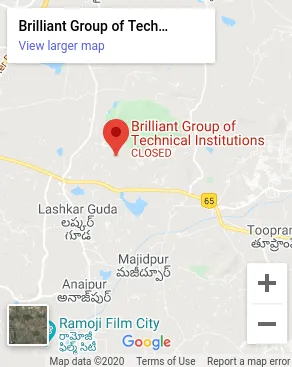Department of Electrical and Electronics Engineering
EEE Dept Bulletin Board
Department of Electrical and Electronics Engineering is part of our institute since its inception and has grown exponentially over the last few years, and is persistently developing to meet the recent trends in computing.
With the objective of imparting value education in the field of Electrical and Electronics Engineering, the department has a prominent team with experienced, veteran and dedicated faculty, well equipped labs with the state-of-the-art computing system and peripherals.
With swiftly evolving technology and the incessant need for innovation, it has been the department’s ongoing attempt to produce quality technologists for our country.
We conduct lots of trainings and workshops on the trending technologies to all our students (We have conducted Android Application Development Training for Free to all our students in the academic year 2016-2017).
College Approved by AICTE, TSCHE and is affiliated to JNTUH
Department was established in the 2008
UG Program
Started in 2008 with intake of 60
Strength increased to 120 in 2011
PG program
Power electronics is started in 2014-15 with an intake of 18.
Infrastructure & Labs as per the norms, R&D , In-house Project Facilities for the students
National Level Technical Seminar every year, Publishing a Departmental Magazine and News Letter
Workshops, Add On programs, Guest lectures and Industrial visits are organized for the students.
Vision of the Department
To prepare graduates for a rapidly changing technological field and the faculty is to strive continuously in pursuit of excellence in education, research and train the students in a technically sound and challenging manner to pursue professional careers and to solve problems relevant to the best industrial practice of Electrical and Electronics Engineering design.
Mission of the Department
The Department of Electrical and Electronics Engineering provides a progressive environment for learning through systematic teaching methodologies, rigorous practical training and contemporary curriculum.
Actively engage and mentor students in scholarly and creative endeavors to develop the ability to navigate through a rapidly changing technology and society.
Faculty dedicate through excellence in teaching, exemplified by a free exchange of ideas, fostering new understandings through research and creativity.
Program Education Objectives {PEOS}
Apply knowledge of Mathematics, Science and Engineering to solve the complex problems in Electrical and Electronics Engineering
Identify, formulate, design, analyse and implement an electrical and electronics system, component, or process to meet desired needs
Design system components that meet economic, environmental, social, political, ethical, health and safety, and sustainability requirements
Conduct investigations of complex engineering problems including design of experiments, analysis and interpretation of data, and synthesis of information to provide valid conclusions
Construct, select and apply appropriate techniques, resources, and modern simulation tools to solve complex electrical and electronics circuits
Apply contextual knowledge to assess social, health, safety and cultural issues and endure the consequent responsibilities relevant to professional engineering practice
Utilize core engineering knowledge in a global, economic, environmental, and societal context for sustainable development
Solve professional, legal and ethical issues pertaining to core engineering and its related fields
Function effectively as a team member or a leader to accomplish a common goal in a multi-disciplinary team
Communicate effectively in both verbal and written forms
Apply knowledge of engineering and management principles to manage projects effectively in diverse environments as a member or leader of a team
Engage in independent and lifelong learning for continued professional development
Program Outcomes (POS):
Engineering Knowledge: Apply the knowledge of mathematics, science, engineering fundamentals, and an engineering specialization to the solution of complex engineering problems.
Problem Analysis: Identify, formulate, research literature, and analyze complex engineering problems reaching substantiated conclusions using first principles of mathematics, natural sciences, and engineering sciences.
Design/Development of Solutions: Design solutions for complex engineering problems and design system components or processes that meet the specified needs with appropriate consideration for the public health and safety, and the cultural, societal, and environmental considerations.
Conduct Investigations of Complex Problems: Use research-based knowledge and research methods including design of experiments, analysis and interpretation of data, and synthesis of the information to provide valid conclusions.
Modern Tool Usage: Create, select, and apply appropriate techniques, resources, and modern engineering and IT tools including prediction and modeling to complex engineering activities with an understanding of the limitations.
The Engineer and Society: Apply reasoning informed by the contextual knowledge to assess societal, health, safety, legal and cultural issues and the consequent responsibilities relevant to the professional engineering practice.
Environment and Sustainability: Understand the impact of the professional engineering solutions in societal and environmental contexts, and demonstrate the knowledge of, and need for sustainable development.
Ethics: Apply ethical principles and commit to professional ethics and responsibilities and norms of the engineering practice.
Individual and Team Work: Function effectively as an individual, and as a member or leader in diverse teams, and in multidisciplinary settings.
Communication: Communicate effectively on complex engineering activities with the engineering community and with society at large, such as, being able to comprehend and write effective reports and design documentation, make effective presentations, and give and receive clear instructions.
Project Management and Finance: Demonstrate knowledge and understanding of the engineering and management principles and apply these to one’s own work, as a member and leader in a team, to manage projects and in multidisciplinary environments.
Life-Long Learning: Recognize the need for, and have the preparation and ability to engage in independent and life-long learning in the broadest context of technological change.
Design, implement, test and evaluate a computer system, component, or algorithm to meet desired needs and to solve a computational problem
Ability to analyze ,design and implement hardware and software components.
Short-Term Goals
To lay a strong foundation in science, mathematics, principles and technological advancements in Electrical & Electronics Engineering and allied fields
To modernize all its laboratories
To organize add-on courses each semester to expand students’ knowledge
To encourage aspiring engineers and technocrats to take up industry-specific projects
To train and educate students in global technological trends for an overarching vision
To incorporate modern teaching techniques for advanced learning
To enhance the faculty and staff members’ knowledge in technological advancements in the discipline
Long-Term Goals
To digitalize all study material of the department for enhancing accessibility
To spark off within students the drive to participate in community development programs
To establish cutting-edge research facilities in the department
To become a globally-recognized Centre of excellence in the field
To take up large, impactful R&D projects with various research organizations
To enable students and faculty to provide consultancy to various industries
To establish collaborative programs with foreign universities
Industrial Connection
The EEE Department works closely with several related industries of repute. These relationships facilitate joint research, funded projects, and the opportunity to learn the latest technologies.
Experts from industries and leading institutions are invited every fortnight for technical lectures under the association activities. The department has collaboration with various industries in terms of members of Board of Studies, offering credit courses, conducting workshops & faculty development programmes, offering internships, projects and placements etc. Students are sent on industrial visits to companies and they also undergo in-plant training at foreign industries as well.
Careers
The EEE Department effectively prepares students to pursue leadership, technical, and management positions in a variety of industries. Students have obtained successful placements at leading companies like Infosys, Wipro, Cognizant, TCS, IBM, Microsoft, Oracle etc. Some of the alumni are successful entrepreneurs abroad.
Department Contact Details
-
Head of the Department:
Mr. S. PAPA RAO
M.Tech
Phone: +91 99480 68424
Email: [email protected]
Important Email IDs
-
Principal: [email protected]
Admisions: [email protected]
Enquiry: [email protected]
Placements: [email protected]
Career: [email protected]
Important Phone Numbers
-
Principal: +91-965-292-9786
Admisions: +91-955-066-1664
Enquiry: +91-955-066-1664
Placements: +91-995-198-0625
Quick Links
Department Phone Numbers
-
CSE: +91-741-673-7514
ECE: +91-998-986-3476
EEE: +91-994-806-8424
CIVIL: +91-800-849-2559
MECH: +91-970-563-1243
MBA: +91-955-066-1664
H&S: +91-995-949-7392



